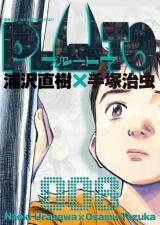Pluto is something of a disjointed narrative that seems to want to say a lot but trips over itself so clumsily that I can't really take it as seriously as it wants to take itself.
To be clear this is a mostly competent story but it's definitely strongest at the start and gets progressively worse as the series goes on, culminating in a fairly contrived ending. This is a similar pattern to that of the other Urasawa work I have read/watched, Monster, where the general concept of the story and sense of journey is strong but the landing can't be stuck and in the end it undermines the strength of the story overall. I am starting to recognize that his personal quirks as an author and his method of storytelling is at best not something I personally gel with and at worst comes across just not as proficient and skilled as his reputation would suggest.
The world Urasawa creates here is admittedly fairly unique and creative, mixing elements of real-world places with a healthy dose of fictionalized aspects and overlaying it onto a semi-near futuristic setting that feels distant in some ways but not too distant in others. You have flying cars and advanced humanoid robots but police detectives still wear cheap suits right out of the 90s, that kind of thing. It's charming in many ways and you are left wanting to know more about the world and it's history but we don't get all that much.
Ultimately Urasawa doesn't appear interested in showing us how this imagined human-robot society and economy even works. What percentage of the population are robots? How and why have they not fully displaced humans from the workforce? While it's fine for Urasawa not to want to get bogged down in the details, when your story centers around human-robot relations and interactions these kinds of details strike me as important to consider if you want to craft a fleshed out and believable world which is able to carry the weight of your messages and themes.
The problem here isn't necessarily the setting, it's the fact that Urasawa seems to want to cash-in on the spectacle and novelty of futurism without thinking critically about how such a future could even exist. While this would be fine if this was a comedy or action-oriented series, it's clear that Pluto is intended to be a more cerebral and thoughtful piece of fiction. It comes across as Urasawa wanting to use robots and artificial lifeforms in a way to say something unique about the concepts of life and death but then not bothering to grapple with the details and mechanics around how or why loss in the context of an artificial and presumably fairly robust robot life would mean as much as loss of fragile and fleeting human organic life.
As far as themes explored I find them to be rather ham-fisted and incredibly unimaginative for a work in a sci-fi futuristic fantasy. For instance why on Earth could a robot, once physically "killed", not have their intact memory chip placed into a new body and essentially reborn or revived? This is perhaps the entire point in having removable personality or memory chips in such a world. Your body gets destroyed? No problem, here is a new one. In fact actual human characters in this same world are described as having been turned into robots/cyborgs after their human bodies are destroyed but the actual robots whose bodies perish can't be reconstituted? This is never explained or explored and it's just so dumb given how the story tries to say so much about the tragedy of loss and considering the melodrama that is employed it's just hard to take anything else in this world all that seriously.
Other aspects of the world are also begging to be scrutinized. Urasawa wants us to believe that there have been 38 previous central Asian wars prior to the continually referenced 39th? Where is the real-world analog to this to help make it even remotely believable? Come on. It would have sounded much more plausible if this event was the "5th central Asian war" for instance but Urasawa apparently wanted to impress the audience with such a high number. I'm not impressed, I'm just taken out of the world. This may seem like a small detail but these little contrivances are common and they add up and erode at your immersion and the believability of this setting and the perceived quality of the worldbuilding. When a story takes itself this seriously then so do I and that means some of the silly choices get less of a pass.
The best parts of the story are the small snippets where interesting characters appear and vignettes that tell a condensed story within the larger narrative of Pluto. Sometimes it is the back and forth banter centered on a legendary robot murderer held in something approximating a maximum security prison who came across as a bit too cartoonishly evil but captivating and original at the same time. Other times it was the C plot like the journey of radicalization taken by a man whose murdered brother was part of a anti-robot hate group and the journey coming full circle to the man's subsequent deradicalization and grappling with forgiveness. These episodes within episodes were much more compelling than the actual A or B plots at times.
Where Urasawa is strongest is when he starts to weave vague notions of international conspiracies, shadowy interest groups, slowly building up with the pace of a semi-psychological thriller... but this mostly falls apart as more is uncovered and revealed the less interesting it all turns out to be in the end. Many of the moments intended to be gasp-inducing pin-drops elicited only an eye-roll from me due to how predictable, telegraphed and self-indulgent they were in execution.
I am left unconvinced that this story offers any kind of profound commentary on war, existence, purpose or really any other theme. The anti-war message for example that is touched on repeatedly came across as fairly simplistic and juvenile in it's black-and-white presentation of one side as totally guilty and the other fully framed and misunderstood. Beyond that the message could be summarized as "war is bad". It's all just way too neat, tidy and preachy to carry any real weight and this is how I received the story's other attempts at philosophy.
Having both read the manga and watched the anime I can confirm that very much like Monster before it this is a very faithful manga-to-anime adaptation. It's basically 1:1. But like Monster that means that all the flaws of the manga's narrative translate directly to the anime as well. If I had to recommend one over the other I would probably go with the anime for the animation and presentation alone.
As a work of sci-fi entertainment and as a decent thriller story it isn't bad at all but it is difficult for me to see it as something more profound.






